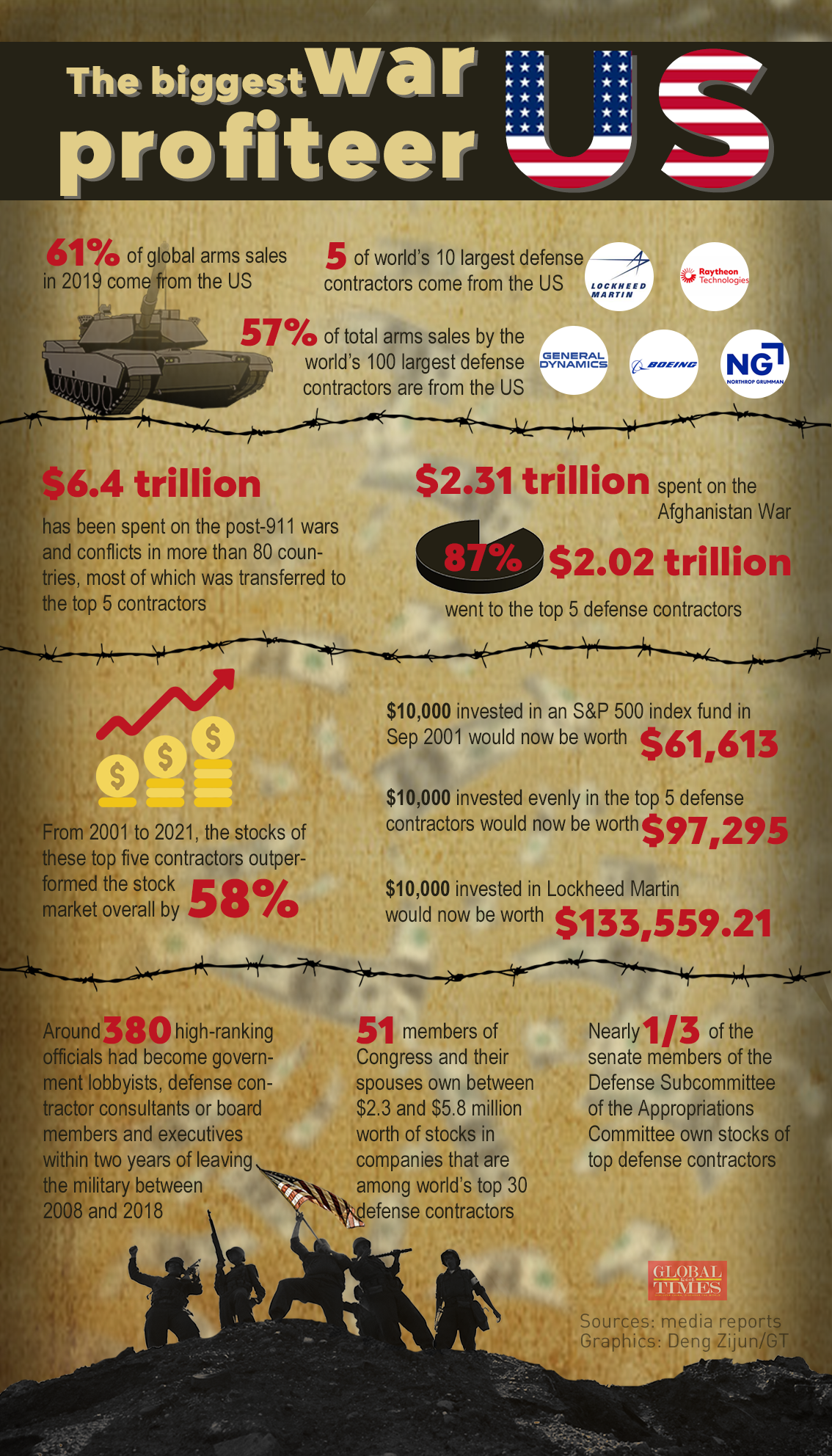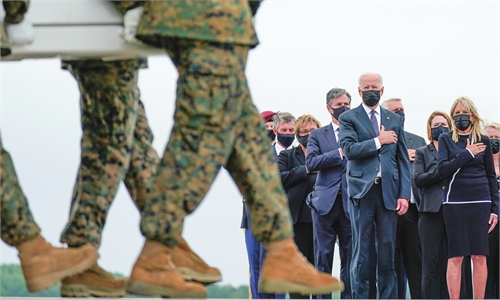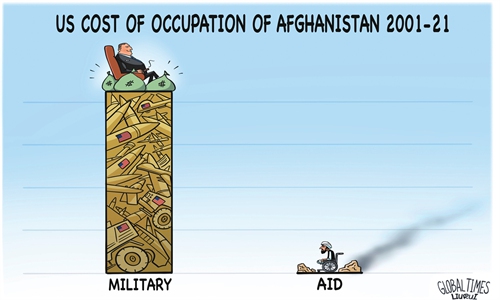Black money behind war: How the US military-industrial complex has thrived after attacks in Middle East

The biggest war profiteer—US. Graphic: Deng Zijun/GT
The withdrawal of the US military from war-torn Afghanistan has been widely seen as a failure in politics. However, analysts pointed out that the 20-year war means rather an "extraordinary success" for the American Military-Industrial Complex (AMIC) composed of private arm dealers, lobbyists and Pentagon's officials who perpetuated war and got immense profits from the attacks.
The American independent think tank Security Policy Reform Institute (SPRI) recently released a list of the top beneficiaries from the Afghanistan War, which includes well-known US military contractors like Lockheed Martin, Raytheon, General Dynamics, Boeing and Northrop Grumman.
Experts pointed out that from Iraq to Syria and Afghanistan, the US' military-industrial complex, fueled by huge economic lure, has created an enemy target: terrorists.
This reminds of the US former president Dwight Eisenhower's warning in early 1961 that "an immense military establishment and a large arms industry" had emerged as a hidden hand in US politics.
Analysts say that the essence of AMIC's system is relying on an axis of influence of private dealers, lobbyists and defense officials that developed a self-sustaining and recycling attack-driven industry.
"The AMIC has profoundly shaped American politics. Its main policy orientation and driving force is to encourage the US to repeatedly engage in foreign wars to profit from them and launch the next round of attacks," Li Haidong, professor at the Institute of International Relations of the China Foreign Affairs University, told the Global Times on Wednesday. "Waging bloody wars is the motivation of the US military-industrial complex to survive, which is also doomed to lead to more instability and chaos in the world."
Huge bonus from wars in Middle East
The US wars in Afghanistan, Iraq and Syria have cost American taxpayers $6.4 trillion since they began in 2001, according to the report by the Watson Institute of International and Public Affairs at Brown University published in November 2019.
Taxpayers in the US were exploited financially by the government's immense military expenses. From 2001 to 2021, the US annual defense budget has kept rocketing. According to the latest study by the Cost of War Project of Brown University, the war in Afghanistan has cost $2.3 trillion. That is an expense of $300 million per day for 20 years.
Countless dollars were turned into weapons like Black Hawks, Scan Eagles, Humvees and carbines to kill the peoples in the Middle East region.
In less than two decades, the price of shares of the top five defense contractors mentioned before has increased between 3 and 12 times. And the defense stocks outperformed the stock market overall by 58 percent during the Afghanistan War, according to a US-based online publication, Intercept. The war only turns out to make those "legitimate killers" build up their bloody empire on the pillars of Afghan skeletons.
The US has half of the world's 10 largest defense contractors and 43 out of the top 100 defense companies, according to media reports.
Lockheed Martin, by far the worldwide largest defense contractor, got about 70 percent of its $53.8 billion net sales from the US government in 2018, more than the entire budget of the Internal Revenue Service and Environmental Protection Agency combined.
The fourth largest military contractor, Raytheon, a missile and long-range precision weapons provider, is regarded as one of the five US-based arms manufacturers dominating the world's mainstream arms deals, with global customers in over 80 countries. The US and many of its allies rely on the company's radars and ballistic missile interceptors as part of their defense strategy, the USA Today reported.
"Quite a part of such colossal profit of arm dealers was used as lobbying costs or political contributions and became pocket money for congressmen. This could explain why the revision and approval of the defense budget went through in such a smooth manner that supporters of medical care or gun control acts never dreamed about," Xin Ping, a commentator on international affairs, told the Global Times.
Symbiotic relationship
Back to 2011, Wikileaks founder Julian Assange once stated that the purpose of the US anti-terrorism attack in Afghanistan was "to have an endless war, not a successful war […] to wash money out of the tax bases of the United States [...] into the hands of the transnational security elite."
The Swiss newspaper, Neue Zürcher Zeitung, shared a similar view pointing out that reconstructing Afghanistan was never the true intention of the US. "Trillions of dollars out of the pockets of American taxpayers were spent on the war, and only a fraction of the money went to rebuild the country," it reported.
A Foreign Policy report on August 16 suggested that about 80 to 90 percent of US expenses on Afghanistan finally returned to the US economy due to the heavy reliance on the complex ecosystem of AMIC.
Media reported that there are thousands of lobbyists in Washington to promote the ever-expanding but unnecessary military and defense budget in Congress largely out of personal interests.
The former Secretary of the US Department of Homeland Security Michael Chertoff, for example, once pitched a massive purchase of expensive, but widely-criticized, full-body scanners used in airports to hold back the terrorist threat. But few people know that the manufacturer of the machine is actually a client of Chertoff's security consulting agency, according to media report.
It is a common trend in the US that some congressmen tend to secure a post in those big-money makers and develop old tricks with their Hill colleagues, Xin suggested.
"As to the Pentagon, it obtained the weaponry it needs to propel the chariot while chanting 'protecting human rights or defending democracy.' They purported to safeguard the universal value, but what they really defended was the endless money flow from constant wars," said Xin.
A recent report on the Washington Post unveiled a list of US generals that led the mission in Afghanistan and who have thrived in the institutions after their service. The report said they have amassed influence within businesses, at universities and in think tanks, in some cases selling their experience in a conflict that killed an estimated 176,000 people, cost the US more than $2 trillion and concluded with the restoration of Taliban rule.
"The eight generals who commanded American forces in Afghanistan between 2008 and 2018 have gone on to serve on more than 20 corporate boards, according to a review of company disclosures and other releases," the Washington post reported.
The angry ordinary American may never know that the military-industrial complex has easily obtained the budget approval again and again from Congress despite that surveys of mainstream public opinion show a strong opposition against the wars in Iraq, Syria and Afghanistan, experts said.
"It is what Eisenhower described as the 'misplaced power' of the military-industrial complex, power that makes public opposition and even thousands of dead soldiers, immaterial. War may be hell for some but it is heaven for others in a war-dependent economy," Jonathan Turley, a professor of Public Interest Law at George Washington University said in his opinion piece to Al Jazeera.
The AMIC, with its accumulated wealth and extensive influence, has gradually become an important part of American politics. Even elected politicians rarely dare to challenge or weaken its power, Li told the Global Times. AMIC is deeply involved in industrial chains that many people depend on and that is even an important pillar of the economy in many regions, Li noted.
"In the long run, it poses a great threat to American diplomacy and foreign defense strategy, but the deeply-rooted defects of its own political system cannot eliminate this fundamental contradiction," said Li.
Overall, the US' foreign and defense policy was not developed based on a rational brainstorm and long-term strategic vision. Rather, it is generated by the fierce collision of different interest groups. It is far from being sensible and balanced, Li said.




